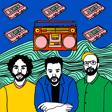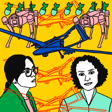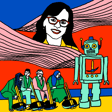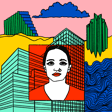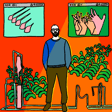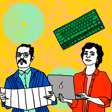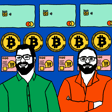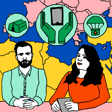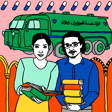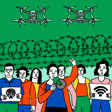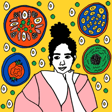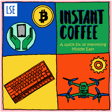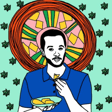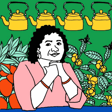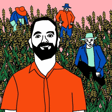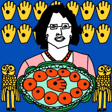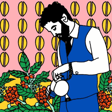Become a Creator today!Start creating today - Share your story with the world!
Start for free
00:00:00
00:00:01

1.2. Arts under occupation with Ahmed Masoud
On the second episode of Instant Coffee, Sinéad Murphy (@DrS1neadMurphy) talks to Ahmed Masoud (@masoud_ahmed) about 'Obliterated', the play that never happened. Ahmed is a Palestinian & British writer from Gaza, living in London/UK. Author of the mystery novel Vanished & The Shroud Maker.
Transcript
Introduction and Emotional Impact of Rights Removal
00:00:00
Speaker
Some people thought it was inconsiderate to do this. And I take their point. I completely take their point and I accept it. But it is also the point. It is about the inconvenience. It is about the pain of losing that opportunity. And it's exactly what I was trying to do, is to actually take away your right and see how you feel about it.
Meet the Guests: Sinead Murphy and Ahmed Masoud
00:00:20
Speaker
This is Instant Coffee, a new podcast brought to you by the LSE Middle East Centre and produced by me, Nadine Almanasti. And me, Rubel Slim and Heider.
00:00:32
Speaker
On this episode, Sinead Murphy talks to Ahmad Masoud about Obliterated, the play that never happened. Sinead is a postdoc research fellow at the Free University of Berlin working on Middle Eastern speculative fiction. Ahmed is a Palestinian writer and director living in London. Over to you, Sinead.
Nostalgia and Homesickness: Weather and Memory
00:00:52
Speaker
So hello to Ahmed Masoud, and it's a real pleasure to be able to talk to you today. How are you doing? I'm good, thank you. Thank you very much for having me.
00:01:00
Speaker
Oh, such a pleasure. I'm really excited to get to talk to you, especially a man of many different exploits, creative, analytical, academic. So yeah, I guess the first thing is just to ask how you're doing during this kind of lockdown period, how you're managing to work if you're managing to work, how that's been affecting you recently.
00:01:21
Speaker
Yeah, I'm good. I'm really happy with the weather. I know a lot of people are complaining about how hot it is in London at the moment. But for me, it's brilliant. What could I ask for more? You know, we've got lockdown, just like in Gaza, and heat, hot weather. So perfect. I just feel at home right now. But it does, in a way, it does make me feel a bit homesick, to be honest with you. There's something about the warmth of the sun.
00:01:46
Speaker
and the memories of growing up in Gaza and the family and being on Gaza beach, playing, swimming and being with friends and family that somehow gets amplified when the weather is hot here in London.
00:02:02
Speaker
Absolutely. Yeah. You've even written about that I think quite a few times in different ways. Just feeling about feelings of being kind of far away from family and homesickness. And yeah, it's kind of a bittersweet thing that like the lovely weather outside really makes you think of that, especially of being by the sea. I know you've written about being kind of by the seaside.
00:02:23
Speaker
by the beach in Gaza a lot of times. Yeah, it's a very special place for me Gaza Beach. It's a beautiful Mediterranean beach that has everything that a Mediterranean beach has to offer. Think of it like Spain, Italy, Greece, all of these lovely places that people think about in terms of holidays, etc.
00:02:48
Speaker
For me, I really hope that I would live the day that Gaza becomes like that in a way, because it has so much to offer in terms of not just the warm weather, but also the culture, the food, the people, the warmth of the people, and the variety of Palestine in general from one city to the other.
00:03:13
Speaker
where you've got in Palestine you've got mountains you've got rivers you've got you've got the beach of course it's a very very unique place and has of course has you know a special place in my heart
00:03:28
Speaker
I'll notice that of all of the coastal places you mentioned, you didn't talk about Ireland, but I'll forgive you that. I think if you don't mind me kind of asking this in relation to one of your works, one of the things you just mentioned, what you're saying about the kind of variation in the landscape from one city to the next in Palestine in Gaza is really making me think of your science fiction or short story.
Future Vision: Palestine as Independent City-States
00:03:50
Speaker
And I'm particularly interested in that because that's my kind of research area of interest.
00:03:55
Speaker
So I really, really enjoyed that short story. So for those not already familiar with application 39, it's one of the short stories in the Palestine plus 100 volume of science fiction short stories, which was published last year. And in that story, you imagine a future Palestine, which is made up of independent city-states, of course. So it's a future Palestine of 2048, where after, I think you mentioned in the story that there's been
00:04:24
Speaker
a series of wars in 2025 and the independent city states are still separated by borders controlled by Israel. So I wondered if there was anything kind of on your mind recently throughout the course of that story or now that kind of speaks to your kind of creative prompts for that story if you give us an idea of
00:04:43
Speaker
How that story came to you as a premise? Yeah, I mean, it's an interesting one. It's an interesting question, to be honest with you, because a lot of people think that this story comes from a pessimistic view of the future, where Palestine is further divided into independent states, as you said.
00:05:02
Speaker
And the fact that there is no hope for the future as it were. So further divisions, further borders, further controls, etc. But actually where it started from is from my thinking and kind of assessment and really thinking a lot about Palestine and what it means.
00:05:25
Speaker
and the idea of Palestine and the concept of Palestine and the different Palestinian communities themselves. There are so many multiple Palestinian communities. You've got the diaspora of Palestinians. You've got the Palestinians in the West Bank, the Palestinians in Gaza. Even within Gaza, you've got the refugee Palestinians who left their homes in 1948. You've got Palestinians who are living within Israel.
00:05:50
Speaker
Now, of course, we all share that cause, we all share that dream of having a free Palestine at some point. But our experiences are different. The things that we've gone through, the things that we have learned and shaped our personalities are quite different, and perhaps make us a bit more protective of who we are. Perhaps maybe this is why the West Bank and Gaza are separated, not just geographically, but also from a government political perspective, you've got Fatah.
00:06:19
Speaker
as the ruling party in the West Bank and Hamas in Gaza. It's what occupation does and it's what apartheid does in a way. It divides. It's that idea of divide and conquer, you know, concept. And my imagination in the future that will only get worse because without a real will for peace in the Middle East and in Palestine from both parties, from Palestinians and Israelis,
00:06:46
Speaker
I think you will find that people will become more and more protectionist of their surrounding area. That's the only thing they can do. They can't control the outside, they can't control another city, another region, etc. So I try to imagine Palestine in 2048 with that.
00:07:03
Speaker
But it does, the story, the short story, does end on a kind of positive note. I don't want to spoil it for the listeners. They need to just find out what that positive note is. There is always a silver lining in, I think, any writer's work, I suppose, unless you're Ernest Hemingway.
00:07:23
Speaker
Yeah, exactly. Don't read Ernest Hemingway, read this short story. That's definitely the message I would say. I agree. I think it's actually also, like you say, an assumption that goes along sometimes with science fiction. I find it really interesting what you're saying about kind of opening up a conversation about what Palestine means, especially when, like you say, it has to like understanding Palestine as a collective.
00:07:46
Speaker
that also takes in such varied experience. That's something that obviously is a challenge from kind of a policy, a political point of view, but also a cultural production point of view. And yeah, I think that there's a lot of thought at the moment about, I suppose, thinking about the dynamics of power under the context of settler occupation. I think that's being brought to mind for a lot of people with
00:08:09
Speaker
of instances of solidarity with the Black Lives Matter movement. I've seen a lot of that on social media, on popular commentary at the moment. So I wondered if maybe if you've observed that or if you have any thoughts on the kind of ways in which there are sort of new possibilities for solidarity with Palestinians in terms of what's going on at the moment.
Solidarity Movements: BLM and Palestinian Causes
00:08:30
Speaker
Yeah, absolutely. I mean, I think that there are, there is huge connections between the Black Lives Matter and the Palestinian sort of kind of freedom or activist movement, let's say, and the solidarity movement in general.
00:08:47
Speaker
I think perhaps it was a bit stronger during the events of Ferguson when that was happening. This time I think it's there, it's very much strong, it's very much alive. You see in demonstrations the Palestinian flag is very much prominent in there, in most of the demonstrations we saw in the US and also in London.
00:09:13
Speaker
I don't know. I mean, for me, I feel like there has been a shift in here with the Black Lives Matter Solidarity Movement specifically. I fear, and that's my own fear, that somehow
00:09:28
Speaker
It might be used now as a power struggle between U.S. political parties with Trump being the president etc an election coming up. That is my personal view and I could be completely wrong and I hope that I am completely wrong and all that sort of movement we've seen on TV recently is really genuine and completely to the point because that's the right thing to do.
00:09:50
Speaker
But similarly in Palestine, a lot of the solidarity movement has been also, in some ways, has been also a power struggle between different factions within either the Arab world or worldwide. You've got Iran have their own supporters, you've got the Gulf have their own supporters, they pump money into it, and therefore the whole kind of movement or solidarity movement has been hijacked to a certain degree.
00:10:16
Speaker
But nonetheless, on the ground, on the people who are suffering, I think Palestine was the first, or Palestinians were the first to draw a mural of George Floyd on the apartheid wall, on the separation wall. What happened in Palestine as well, where you have somebody also killed a week after or two weeks after Palestinian, a dyslexic Palestinian, who was killed in similar circumstances in a way by Israeli soldiers, and that didn't get attention.
00:10:45
Speaker
and that kind of gave people some frustration in a sense. But I think there are a lot of connection between the solidarity movement in Palestine and outside and the Black Lives Matter in general. There are a lot of joining up in terms of highlighting the experience of the oppressed. That's what we have in common. We are both oppressed. We are both
00:11:09
Speaker
the experiencing racial discrimination just because of who we are. I think as we go through a little bit further with it as well, and as these events mature even more, we will see far more connection between both and far more collaboration between solidarity movements on both sides, but also specifically from artists. I wanted to sort of bring you back to something that you mentioned in relation to your play, but obliterated.
Art as Protest: The Unwritten Play 'Obliterated'
00:11:36
Speaker
I was really struck by one of the things you wrote in your blog post about this, saying that you said, I cannot write, but I still want to protest. And I found that very, very striking, very heartbreaking to see kind of the way in which you were grieving the disruption of the Said and Michelle Theatre, the Cultural Centre rather. But still trying to locate this urge to write, to protest, to articulate your view through creative work.
00:12:04
Speaker
But yeah, I wanted to kind of take us to talk about obliterator for a minute, because I think that's one of your pieces that a lot of people are really interested in. I don't know if this is the right thing to call it, but I almost think of it as like a performance piece, I guess, rather than a piece of theatre. But yeah, I guess I would be interested to hear your thoughts on how you conceptualise that, because from what I understand about the kind of timeline, this was in response to the destruction of the
00:12:33
Speaker
site on the shelf cultural centre and then it was very much within kind of months within the year that you sort of staged this performance piece. So maybe you could tell us about your kind of motivations, your process in coming to put that piece to stage.
00:12:49
Speaker
Yeah, so Obliterated was really, as you said, a protest piece. So what happened in August 2018, on the 9th of August, to be precise, Israel bombed the Sa'id al-Mizhal Cultural Center in the middle of Gaza City. Now, this was the only theater venue in Gaza. We do have other venues, but more like event spaces, lecture halls and wedding halls, etc.
00:13:16
Speaker
This item is how cultural center was the only sort of theater venue available in this trip. And that happened during sort of renewed clashes between Hamas and Israel. And at the time Israel claimed that the reason they bombed the theater was because Hamas was hiding weapons in there. And they released aerial footage of it, basically. And it turned out basically it was the green room of the theater.
00:13:46
Speaker
So it was the props that actors use. There was no evidence that there were any sort of action that was happening there at all, or any kind of action from Hamas, or hiding weapons, or missiles, or all of that.
00:14:02
Speaker
But it made me think and made me really, really angry as an artist that how could you just bomb the one and only artist venue in this trip? I mean, it's about taking art from people, it's about taking life away from people. And really,
00:14:21
Speaker
It's just feeling the joy out of people who go to that venue, enjoy the performances. It's really putting all the artists who work there on redundancy, basically, because they have nowhere else to go. And in fact, that is still going on until this day. There's no other theatre in Gaza. Many of my artists, practitioners, actors, writers,
00:14:44
Speaker
they haven't produced any work since then and it just made me think this is actually the point is targeting culture is targeting the cultural production of the people but why and how threatening is that um so anyway i wanted to write a play on that um but i thought a play is not enough it does it's not going to convey what it is i'm trying to say in here so i got together with um maxine pique who's a very well known actress in the uk as you know
00:15:12
Speaker
I was discussing this with her and I thought actually the best way to do it is to really create a play that I never write and she never rehearses or performs but only a week before the event we cancel it.
00:15:27
Speaker
So we got together with Amnesty International as well in London, we created a poster, we had a date of performance on the 9th of August 2019, so on the anniversary of the event of bombing the theatre and we put it on Eventbrite with about 3,700 people booked tickets
00:15:48
Speaker
the tickets were free everybody was so excited to come and see my new play with their favorite artist ever Maxine Peake I mean she is a celebrity so a lot of people just wanted to come and see her because she she is their favorite artist and then a week before the event we cancelled the play
00:16:07
Speaker
and in the email we explained that we were doing this as a protest for the theatre that was bombed in Gaza and we wanted to demonstrate what it means to have art taken away from you, how people would feel, how disappointed they would feel not to be able to see that play that they've put in their calendar, that they've been looking forward to going to
00:16:31
Speaker
that they've told their friends about that excitement around art and the experience of going to theatre. So yeah, in the cancellation email there was also a video from Maxine and the Palestinian poet Farahshama who wrote a poem specific to the event and we distributed it in the email as well and we explained that actually there was never a play, I never wrote it, it was called Obliterated, we had a poster, Maxine was the poster girl,
00:17:00
Speaker
but apart from that there was nothing else really we just wanted to make a point we wanted to protest and of course as i said about three thousand seven hundred people booked tickets so the majority really enjoyed it and got the point and like thank you for doing this
00:17:17
Speaker
But about three or four hundred people, I think about four hundred people weren't happy. Because as you can imagine, some of them had book train tickets, some of them had arranged hotel rooms, and it was inconvenient. It was inconvenient to the point where
00:17:34
Speaker
Some people thought it was inconsiderate to do this and I take their point I completely take their point and I accept it and perhaps maybe in the future I will do something different, but it is also the point it is about the inconvenience It is about the pain of losing that opportunity. It is about Actually that I have stolen something away from you that it is your right It's exactly what you have said in your email to me when you replied and saying well It's my right to see this play because I booked the ticket
00:18:04
Speaker
And it's exactly what I was trying to do is to actually take away your right and see how you feel about it. And the fact that about, you know, 400 people complain about it is actually a success in a sense, because we wanted that effect to happen on people. Yeah. And I suppose when you did this, like when you did this kind of protest, this protest piece, this was an experimental protest piece.
00:18:27
Speaker
we never could have imagined that we would be in our current scenario where no theatre can happen. So I suppose it remains to be seen. But it would be incredible if there was some kind of follow-up to see how your ideas have evolved from that, especially in those different varied reactions.
00:18:46
Speaker
I can totally see it's a really daring piece to pursue, especially when you've moved to the UK in 2002, if I remember correctly, and you've worked so hard to establish your reputation here.
00:19:01
Speaker
and to work in so many different kind of modes, so many different artistic venues. And that is a really kind of daring move, but as you say, it's without that kind of, without that kind of courage to follow that through the effect of kind of the affective dimension of that inconvenience and how it's reflective of something that you're struggling to write, to kind of to interpret artistically, it would be lost.
00:19:31
Speaker
So yeah, I don't know how you feel about how this current break is affecting your ability to do more theatre afterwards, but certainly you've opened up an experimental avenue to pursue if you wanted to do that, I guess.
Theatre in the UK: Pandemic Challenges and Future
00:19:44
Speaker
Yeah, definitely. I mean, as he said, it's a different context now because he would have thought that theatre is not going to run for such a long period now. He would have thought that we can actually live without art and, you know, art venues, I suppose, for such a long time. We're all dying to get back into it. And I think
00:20:06
Speaker
A lot of people in the UK and around the world have followed some of the theatres and they're online, the stuff that they put free stuff online, et cetera, and that was an experiment in its own right. Of course, they can do that, and I think they can recover from that. Maybe not so quickly, maybe in a year, maybe two, maybe after a vaccine has been found and distributed and rolled back to normal, and it's all sorted.
00:20:33
Speaker
But in Gaza, it's not that easy. It takes a long time to establish a venue. A is very expensive, building materials don't come in because of the blockade in Gaza, and actually establishing the network and establishing that production and having that connection with the international community as well.
Rebuilding Theatre in Gaza: Trials and Tribulations
00:20:53
Speaker
because that venue was beginning to become quite a prominent venue in terms of connecting with other theatres in Palestine, twinning with other theatres worldwide. There were some international artists that went there and performed. There was a circus group that was meant to play in there. And that is what is difficult to bring back so easily in terms of bringing that cultural connection with the rest of the world.
00:21:22
Speaker
Theatre is not just a building, you know, it's not just bricks, it's more than that. And also what is going to happen to the artists now, as I said, you know, quite a few of them are my friends who used to work there. I sold them when I went to Gaza last December.
00:21:38
Speaker
And we sat down in a cafe on the beach and they were like, we can't work, we can't produce. And even if we write and rehearse and stuff, where are we going to take it? And who's going to pay for us? Because that venue was also paying for productions, as it were. You know, it is tough. The life of an artist is tough everywhere, not just in Gaza.
00:22:02
Speaker
you know but in gaza is more more so because there is no other support whatsoever you know nothing there is no benefit system for example people can't be on the dole they did you know there is no national health service there is no you've got to earn money so a lot of my friends are now working on building sites
00:22:23
Speaker
Others have volunteered in the market. They're doing some work in the market and selling vegetables. Others are in hospitals, volunteering. And that's what they're doing at the moment. And I think that's going to be really hard to re-establish later on if a theatre is rebuilt again. Yeah, I think you're so right to point out that not only is
00:22:48
Speaker
like the theatre is more than a building, it's a whole set of infrastructures. And a lot of those are actually rendered invisible as well at any given time, just the kind of amount of resourcing and the network building that goes into creating and sustaining these spaces. So yeah, Ahmed, I could keep you here all day asking you about your many different exploits, but I will not do that because you've been very generous to offer your thoughts on this so far. But yeah, I just wanted to say thank you for
00:23:16
Speaker
such a great conversation and for letting us know what you're thinking about at the moment, what you're working on. And we look forward to hearing what you do next on the other side of hopefully this lockdown. Thank you. Thank you so much for having me. It's been a pleasure.
Conclusion and Call to Action
00:23:37
Speaker
Thank you for listening to Instant Coffee, your quick fix of everything Middle East.
00:23:42
Speaker
Join us every Friday for a new episode of Instant Coffee where we interview artists, activists, writers, journalists and more from the region. To find out more about Ahmad's work, follow the links in the podcast description. Also make sure to subscribe to our podcast to stay updated on our latest episodes. Don't forget to follow us on Twitter, Facebook and Instagram. Until next time,
